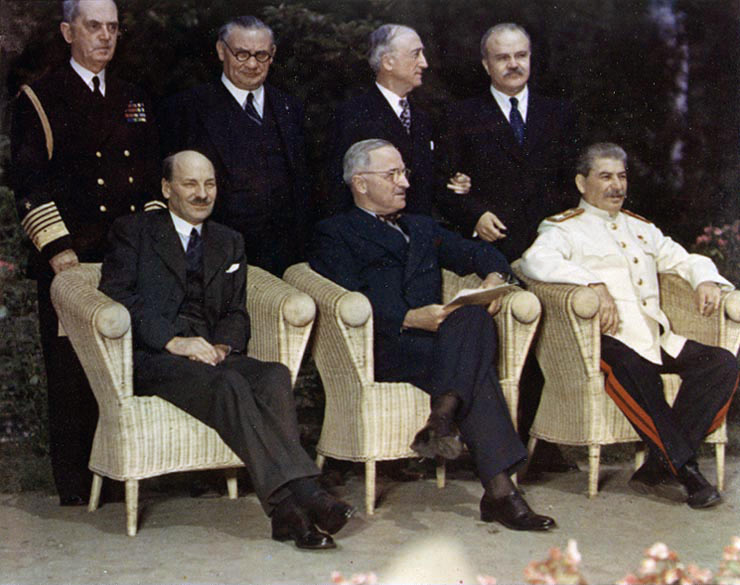There was really quite a bit happening during the last few months of World War II.
 |
| Big Three (UK, US, USSR) leaders at the (end of the) Potsdam Conference |
It has been pointed out that the Potsdam Conference in July 1945 was quite different from the Yalta Conference, just a few months earlier. President Roosevelt had died in April, Germany was defeated in May, and Churchill's Conservative Party had lost the recent elections in the United Kingdom. Which is why the picture above is of Stalin, Truman, and Clement Attlee - two-thirds of the Big Three changed in a few months' time.
Except that Churchill had only resigned the office of Prime Minister a few days before this picture. The Conference started on July 17 and ended on August 2. Churchill resigned on July 26, after the ballots were fully counted. It was only then - 10 days into the conference - that Clement Attlee became the new Prime Minister. How did Churchill get pushed out of the picture?
Well, it turns out that he wasn't completely pushed out. Here's an image from earlier in the conference:
When Nazi Germany was defeated on May 8, Churchill and Attlee had agreed it would be best to keep the coalition government going until Japan was defeated as well. The leadership of the Labour party, on the other hand, ended the war coalition government within the following two weeks, requiring an election six weeks later. Labour may have considered it an opportune time to act, and it appears they were correct.
The campaign started on May 23, and Churchill's conservative party was considered the likely victor. Over the past years of war, Churchill had shown himself a capable leader in a time of intense crisis. This may have led to some complacency on their part. Two weeks into the campaign, Churchill suggested that the Labour would be setting up a "gestapo" to support their policies, a comment that was considered inappropriate.
The UK votes had been tallied on July 26, three weeks after the start of the election on July 5. (The time required was in part because of traditional week-long holidays that delayed balloting in some areas. There was also some delay because of votes coming in from soldiers stationed overseas.) The result was a very unexpected Labour victory.
One may note that July 26, 1945, is the same day as the Potsdam Declaration, and also the same day that Little Boy was delivered to Tinian by the USS Indianapolis, and also the day the Fat Man assemblies departed New Mexico. All on that one day. Busy, busy time.

No comments:
Post a Comment